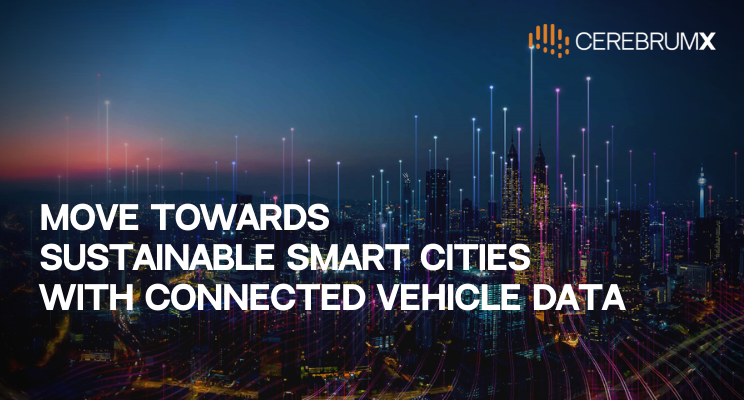Environment experts globally believe that the smart cities of tomorrow will be essential in enabling humankind in leading a sustainable life on this planet. Essentially acting as a hub that’ll utilize intelligence and leverage communication to allocate resources viably, smart cities will aim at enhancing the quality of life of the citizens through a green and environment-friendly approach.
A McKinsey study found that smart city technologies can improve the quality-of-life indicators by 10-30%, resulting in reduced health burden, enhanced safety for citizens, shorter commutes by up to 20%, and reduced emissions by 15%. Connected vehicle data and mobility information play a critical in the evolution of such smart cities. Carefully vetted vehicle data can support energy optimization, low fuel consumption, air quality monitoring, and much more.
Empowering Decision making
While there’ll be a number of components working in perfect conjunction to sustain the idea of smart cities, many believe it is the connected transportation system that’ll play a key role in making a city ‘smart’, or at the very least, emerge as one of the first factors.
With mobility data, smart city planners will be able to implement better and informed decisions, focused not only on the transportation sector but on the overall development of cities of the future. They’ll be able to:
- Plan long term projects, by virtue of continuous access to relevant data.
- Adapt and react to changes, by leveraging the urgency of real-time information.
- Measure and assess ROI of invested efforts, by procuring user feedback and taking action.
- Prioritize the concept of sustainability and green living, through key data metrics from EVs and smart charging infrastructure.
Tackling Urban Challenges – Smartly
When a city is flooded with smart vehicles, capable of collecting data relating to more than a few attributes affecting the citizens and pedestrians, analyzing traffic trends, gathering weather information and reporting collisions, it essentially gets covered with live sensors roaming about it.
Data by virtue of such sensors is highly accurate and effective in enabling a variety of public services such as transportation, emergency and first-response services. Officials get high-level visibility over everything happening in and around the city, with the ability to take smarter and pre-emptive measures in situations of difficulties, such as hurricanes and road-blocks, or planned actions to overcome typical troubles, like diverting traffic, in a timely manner.
How smart cities consume vehicle data?
While the possibilities are numerous, where smart city planners can effectively utilize connected vehicle data for the benefit of the community, here are some key areas that city planners look out for:
- Reducing Traffic Congestion
Real-time vehicle telematics data works like a catalyst in effectively managing traffic congestion. It powers advanced algorithms that cut commuting time, optimize routes and traffic load, synchronize traffic signals and much more.
- Planning Safe Transit
With data actively communicating volume of travelers, journey end-points, delays and even breakdowns, it becomes convenient for smart city authorities to smooth over any inconsistencies and send help when needed most.
- Green Urban Planning
Mobility intelligence and data also helps optimize the city’s architecture in a way that’s not just sustainable but also harmonizes with the connected infrastructure.
- Accelerating EV Infrastructure
When it comes to electric vehicles, smart cities enjoy an upper hand with respect to implementing and managing public sharing networks as well as widespread EV adoption, to curb conventional fuel usage.
Other practical use cases include:
- Facilitating quick and easy load shift from private commute to public transportation.
- Optimizing city ingress and egress points to boost the supply chain.
- Deploying intelligent toll, parking and payment solutions.
- Increasing efficiency in emergency services through adaptive signaling, driver alerts and more.
Accelerate your Efforts towards Sustainable Solutions with CerebrumX
CerebrumX is helping city planners transform the busy cities of today into sustainable hotspots of tomorrow. We do this through the power of data. With the industry’s first AI-powered Augmented Deep Learning Platform (ADLP), we unlock the data from millions of connected vehicles to generate predictive insights that empower next-gen green solutions.
Wat’s more, our white-label consent management platform CerebrumX Secure Consent ensures utmost privacy of drivers’ personal information through explicit consents, to assist optimum data privacy as well as global compliance.
For more information regarding connected vehicle data and the evolving ecosystem around it, Contact us or reach out to our experts.

